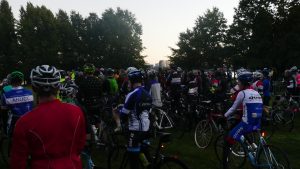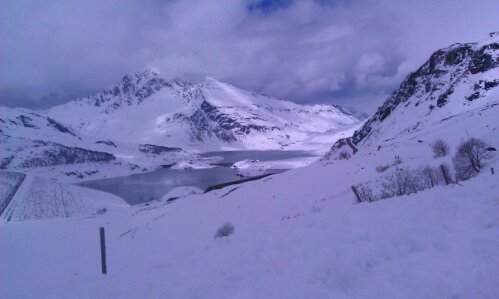Over the last couple of weeks, I’ve been watching the IndyPac – The Indian Pacific Wheel Race. Five and a half thousand kilometres from Freemantle to Sydney, following a set course but otherwise pretty similar in concept to the Transcontinental. I have to tell you, it has been scary.
There were some early departures, and that was no surprise. There will always be a lot of people who talk the talk but then turn out to not walk the walk (or ride the ride, as it is). So I wasn’t worried by that. The first scary moment though was 2,000km in when one of my cycling heroes pulled the pin. Now after many years of having heroes in the pro-peloton who turned out to be druggies and cheats I don’t have many cycling heroes. Probably about half a dozen, and most of them are guys I ride with and against on a regular basis. Some of them I beat quite regularly too, but they are still cycling heroes to me in that they show something on the bike that I would like to see in myself.
That particular hero is a friend of mine. He is strong and fast and well prepared and efficient, and all of those things were showing for the first 2,000km as he raced into third spot and looked like a strong contender for a higher place. A few video clips and interviews along the way showed him to be strong and focused. But he was riding a bit erratically, and finally a picture on facebook showed me why. Seeing his two feet and ankles together it was pretty clear that one of them was stuffed. There was really no way he was going to be able to ride effectively without having quite a bit of time to recover first. Of course, I immediately thought about that happening to me. He had talked about little niggles getting more annoying and harder to deal with – well I am about a decade older with another decade worth of accumulated niggles that could blow up with minimal provocation.
The next scary thing was seeing another of my heroes, who happens to be his partner, also pull the pin. Another great rider who had started more slowly but was steadily working her way up through the rankings, until she decided that fatigue was getting the better of her. Part of me screamed “but you can just go slower” but realistically there is always a time limit to these things. It could easily be that I end up being unable to finish. And that thought was a little bit scary. The fact is that this race is a big focus of my life. I have already put a lot of thought, a lot of time and a lot of effort into it, and to not make it to the finish line is a scary thought.
Meanwhile, at the front of the race there was a fantastic battle going on between two of the best ultra-cycling racers in the world. There were tactics and changes of lead and amazing amounts of strength and endurance. It was a fantastic race, gripping to follow. And then tragedy struck. Mike Hall, founder of the Transcontinental race and holder of more records than I care to list, all round good guy and second place on the road, was struck and killed by a car. I didn’t believe it at first. But it was true. This guy, who was so much larger than life in such an understated way, was suddenly gone.
As a result the IndyPac was immediately cancelled and basically transformed into another of the many, many rides to commemorate Mike that took place around the world. As I write there are still some people following the course to Sydney, but I don’t think that there was anyone who didn’t stop for some time to comprehend when they heard that awful news.

Every road cyclist knows that it is a possibility. It could happen to any of us, at any time. But when it does, it’s still shocking. And it’s scary. It brought home the dangers of what I do, once again. It made me ask myself if it was wise, if I should be riding on the road when there are so many dangers about. Several other people have asked me about it. And several of them have asked if the Transcontinental will be cancelled.
But the race will go ahead. It won’t be the same, of course it won’t. Mike was the driving force behind the race, and it was very much his race, so without him it will change. Having said that, there are several other people involved, and there is no question that they can run a great race. But all of them had a close relationship to Mike. I can barely imagine how hard it must be for those people to think about the race, or indeed to cope with daily life, right now. I imagine that right now they aren’t sure that they want to run a race. I’ve had several people ask me if it will be cancelled, and I can see why. But the race will go ahead.
It just happened that as Mike was hit I was also on my bike, for the last ride I would be able to manage for several days. When I finally got back on my bike three days later, and straight out onto the road, I did of course think of the danger of cars. I also thought of Mike. I thought that I could be driving instead. There was a little bit of rain, it was getting dark, it was chilly. But I was riding. I enjoyed the ride. I was probably more nervous than normal, but I enjoyed it. I wouldn’t have enjoyed the drive. I could have driven, but I’m glad I rode. Assessing the risks, I choose to take the risk of cycling and enjoying it, compared to the risk of driving and not enjoying it.
Now it may be that there is no formal Transcontinental No.5. I doubt it, because I think everyone involved will want to run the race in honour of Mike as much as anything else, but I could be wrong. Before I got my entry slot though, I had come up with a cunning plan of what to do if I didn’t get a slot. You see, the race is unsupported. There are people at checkpoints and start and finish lines to record your times, but I have a watch myself and I can figure out my own times. There are people watching dots or taking photos and videos on the road to post to social media and keep all of the people at home informed, but I don’t need anyone following my progress so that I can pedal. The beauty of an unsupported event is that by its very definition, you don’t need support. You can just get on your bike and ride.
Some of the checkpoints have already been described with enough detail that they can pretty easily be locked in. Others haven’t been quite as clearly stipulated, but I don’t think it would be too tough to work out where Mike had planned for them to be. There may be some sections and challenges that Mike had in mind that we will never hear about, but I think in general from here it would be pretty easy to determine what his plan was, and to ride that. So, at 10pm on the 28thof July I will be on the start line. Because although I realistically may not reach the finish, the scariest thought of all is the thought of not trying. So, I will be there.
I hope there is someone there to say go, and I hope there will be people with a kind word as I pass through the checkpoints. But even if there are no race officials, I’m sure I won’t be the only rider on the start line. And I’m sure every one of us will ride remembering Mike, and grateful that once again he has made at least our worlds better places.
Ride in Peace, Mike.
[jetpack_subscription_form]

I will be more than happy to shake your hand on the start line and join you. I intend to ride, whether it’s an official TCR or not – because like the hashtag I now use, it’s about more than just me. #BeMoreMike
I look forward to it!
I knew Mike Hall died, on the day he passed.
Until reading this I had no idea about his influence and reach in the cycling world, except that the Vets Cycling club did email to say there would be a minute silence at Nara Park on Fri 7th 6:12.a.m.
After reading this I then went to do my once monthly’ish’ check of Mark Ferguson Cycling Maven. Since then I have spent most of this afternoon weeping !!! while watching tributes to Mike Hall.
Check out https://www.youtube.com/watch?v=ldZCKzkQ2hg
#aMetreMatters
Yep, it’s amazing to see the impact he had around the world. Such a tragedy.